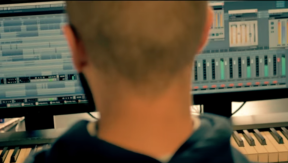
Descubre un montón de consejos que te ayudarán a mejorar
Cuando estudiamos una canción o aprendemos a tocar un instrumento, tendemos a pasar por alto ciertos detalles, sencillos pero importantes, debido a la comodidad y a la ignorancia. ¡Pero esos detallitos pueden resultar extremadamente útiles! Hemos confeccionado una larga lista de ellos para ayudarte a perfeccionar tus habilidades.
No te saltes el calentamiento
Los atletas calientan sus músculos y los músicos y cantantes también deben hacerlo. Si eres cantante, unas simples vocalizaciones y registros bastarán. Si eres músico, los ejercicios de estiramiento estimularán tu circulación sanguínea y cromatismo para aumentar la flexibilidad de tus dedos.
Canta o habla mientras tocas
Esto te ayudará a relajarte, a sentirte como si estuvieras jugando, y te permitirá anticipar mejor las notas, los fraseos y el movimiento de tus manos.
Practica a menudo
Practicar a diario, aunque sea solo un poco, puede resultar mucho más beneficioso que una sola sesión intensiva.
Los metrónomos son tus amigos
Admittedly, this isn’t your must chummy of friends. Metronomes are rigorous, unyielding and don’t allow for improvisation. But like good friends… they are constant and useful. With the help of one, you will learn to accentuate the beat and test your accuracy at varying speeds.
Chart a program
Before each practice session, set a goal and stick to it. Doing so will help you to not waste time on what you already know and master. It will also leave you with a feeling of accomplishment.
Record yourself
A small recorder even your phone will do as hearing what you're doing is the best way to spot mistakes.
Vary positions
You likely practice your instrument sitting down because it is easy and comfortable. But if your long-term goal is to play in public, get in the habit of playing standing up as your hand position will differ.
Change it up
Binary tempo is easy and most natural, but in order to progress you need to push your limits. Break your habits and try 7/8, 5/4, 3/3 and the likes.
Play with others
Tempo, placement, projection... Everything is different when you play with others!
Know your notes and scales
This may seem daunting, but once you’ve learned them they become instinctive and will become a step towards improvising.
Don’t forget your pinkie finger!
Your little finger is perhaps the least flexible and most difficult finger muscle to build, but the pinkie is useful as it allows for extending between a maximum of notes for difficult chords. Don’t hesitate to use it!
Maintain your instrument
Clean it regularly, change any elements that suffer from overuse or wear and tear (for example, the strings of your bass or guitar before they oxidize) and don't forget to invest in proper cleaning products.
Play or sing over another piece
Reproducing what you hear or acting as a counter voice or chorus are all excellent exercises.
Have anything else to add? Share with us below!
Publicada el: 5 de julio de 2016



